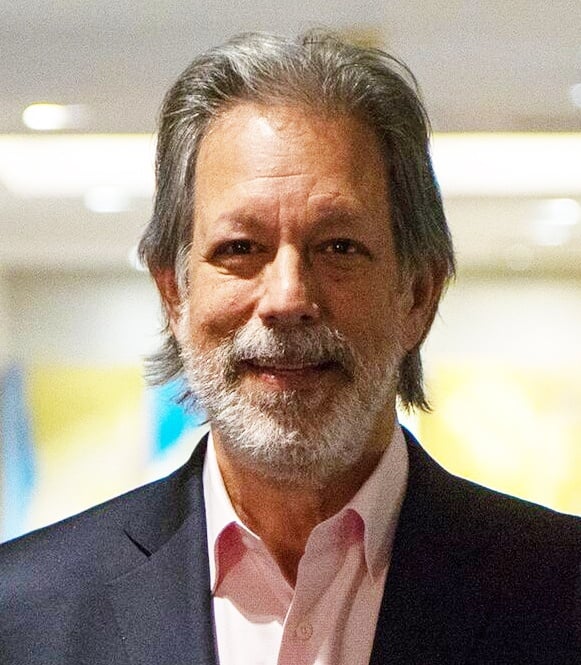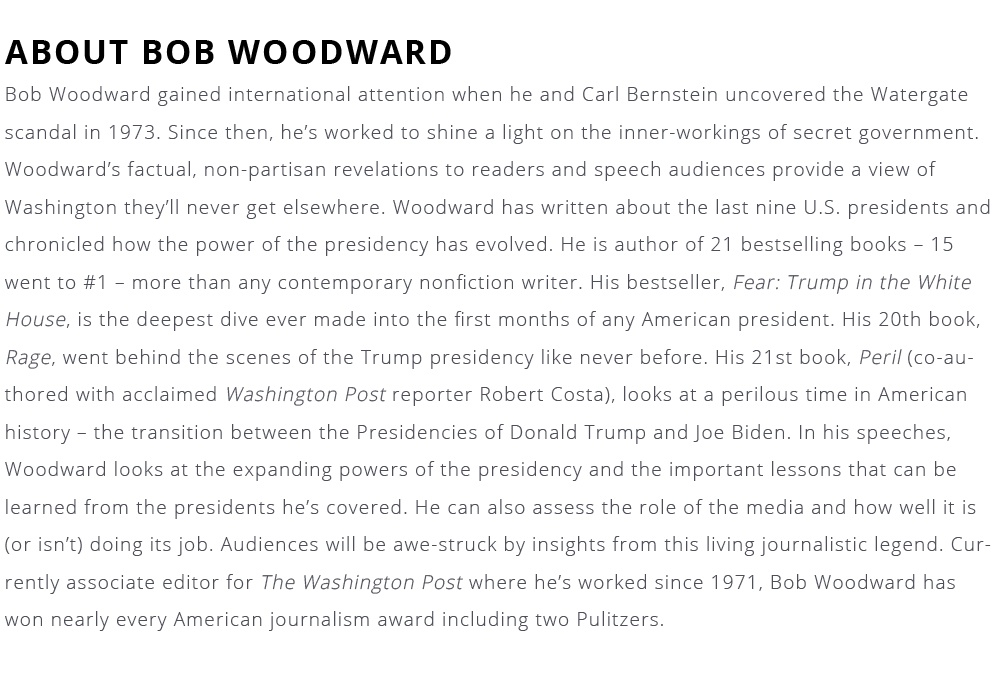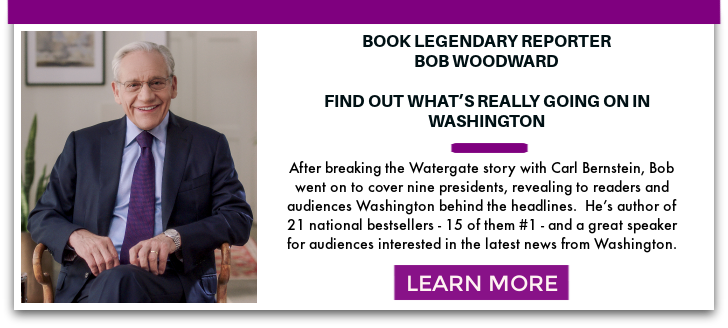Chasing the Elusive Truth – Bob Woodward and the Challenge of Journalism
There’s a story legendary Washington Post political investigative reporter BOB WOODWARD tells in his speeches to make the point to audiences about the craft of investigative reporting. The reporter’s job, the story illustrates, is never really done. The truth unfolds over time – it never drops in a reporter’s lap in one piece. And sometimes, the truth winds up being something very different from where it looked like things were headed at the beginning.
The story relates to Watergate – so-named after the hotel where a break-in occurred at the Democratic Headquarters in Washington, D.C. That bungled burglary exposed the crimes and misdeeds of the president and his administration and led to the resignation of Richard Nixon.
One month after Nixon resigned, President Gerald Ford went on television on a Sunday morning to announce he was giving Nixon a full pardon for Watergate.
Bob Woodward thought to himself, “Of course, he went on television early on a Sunday morning. He’s hoping people would not notice.” But it was noticed, but not by Woodward. Woodward was asleep. “My colleague, Carl Bernstein, called me up and said, ‘Have you heard?’ I said, ‘I was asleep. I haven't heard anything.’ Carl, who truly has and still has the ability to say what occurred with the fewest words and the most drama, said the following: ‘The son-of-a-bitch pardoned the son-of-a-bitch.’”
“I was able to decode that and I was proud of myself. I figured out what had happened and I thought, it's perfect. It's the final corruption of Watergate. Nixon, who's in charge of all this stuff, and gets a pardon, 40 people go to jail, hundreds of careers are wrecked, and so forth. I thought that, and if you look in the '76 election, Carter beat Ford because of suspicions that there was a deal in the pardon”
25 years later, Woodward undertook one of his famous book projects, a book called Shadow that hoped to look dispassionately at the legacy of Watergate in the presidencies of Ford through Clinton. Woodward called Gerald Ford and said he wanted to interview him about the pardon. “I was sure he wouldn't talk,” Woodward said. But Woodward’s preconceptions were wrong. “Ford turned out to be the most open person I think I've ever dealt with as a journalist. I interviewed him time and time again. I had this luxury of time, getting the legal memos, reading the contemporary coverage, and realized and kept going back to him and saying, ‘What happened?’"
Presidential Leadership Lessons: BOB WOODWARD Gerald Ford, The Courage to Lead
“Finally, at the last interview at Ford’s home in Rancho Mirage, I asked him again about the pardon. Ford said, ‘You keep asking me that question,’ and I said ‘Yes, because I don’t think you’ve really answered it.’ ‘You’re right,’ said Ford, ‘I haven’t answered the question and I’m going to tell you something now that I’ve never even told Betty.’ He said, ‘Al Haig, who was Nixon's chief of staff, came and offered a deal and said, 'If you promise you'll pardon Nixon, he will resign.’ Then Ford said to me, ‘But I rejected that deal. I knew I was going to become president. Nixon was finished, and it would be corrupt.’”
“Ford said, ‘I want to tell you exactly what I was thinking. The economy was in trouble. We were in the middle of the Cold War. I had a letter from the Watergate prosecutor saying Nixon was going to be investigated as a private citizen, would surely be indicted, tried, go to jail. We'd have two or three more years of Watergate.’ Ford, in this very plaintive but moving, real way said, ‘I needed my own presidency.’”
Woodward wrote in the book that what he thought was corrupt was actually gutsy. Caroline Kennedy and Sen. Ted Kennedy gave Gerald Ford the Profiles and Courage Award that year for pardoning Nixon. Woodward says now, “I remember watching that. What a cold shower, to be honest. What a humiliation, because I was sure it was corrupt, and then you subject it to 25 years of history, you subject it to a kind of neutral inquiry, and you realize what was corrupt was actually courage.”
If you spend any time talking to Bob Woodward about what’s going on in Washington, it’s clear this experience chastened him to be especially careful about drawing conclusions – spoken or unspoken – about the reporting he’s doing. He continues to pursue what he calls “the best obtainable version of the truth.” In the current political climate, he has on many occasions taken the mainstream media to task for taking the stories too personally. He has urged reporters to just follow the facts and not get caught up one-upsmanship with the people they report on.
It’s that journeyman reporter’s ethic that has made Bob Woodward the most revered and respected investigative journalist of our time. As Bob Schieffer of CBS News once stated, “He may be the best reporter of all time."
About Tony D'Amelio
Tony has spent his career putting talented people and audiences together, first in the music business and later representing the world's leading speakers. After concluding 27 years as Executive Vice President of the Washington Speakers Bureau, Tony launched D'Amelio Network, a boutique firm that manages the speaking activities of a select group of experts on business, management, politics and current events. Clients include: Mike Abrashoff, Mariana Atencio, Chris Barton, Lisa Bodell, Geoff Colvin, Daryl Davis, Suneel Gupta, Ron Insana, Katty Kay, Polly LaBarre, Nicole Malachowski, Ken Schmidt, and Bob Woodward.

.png)

.jpg)


